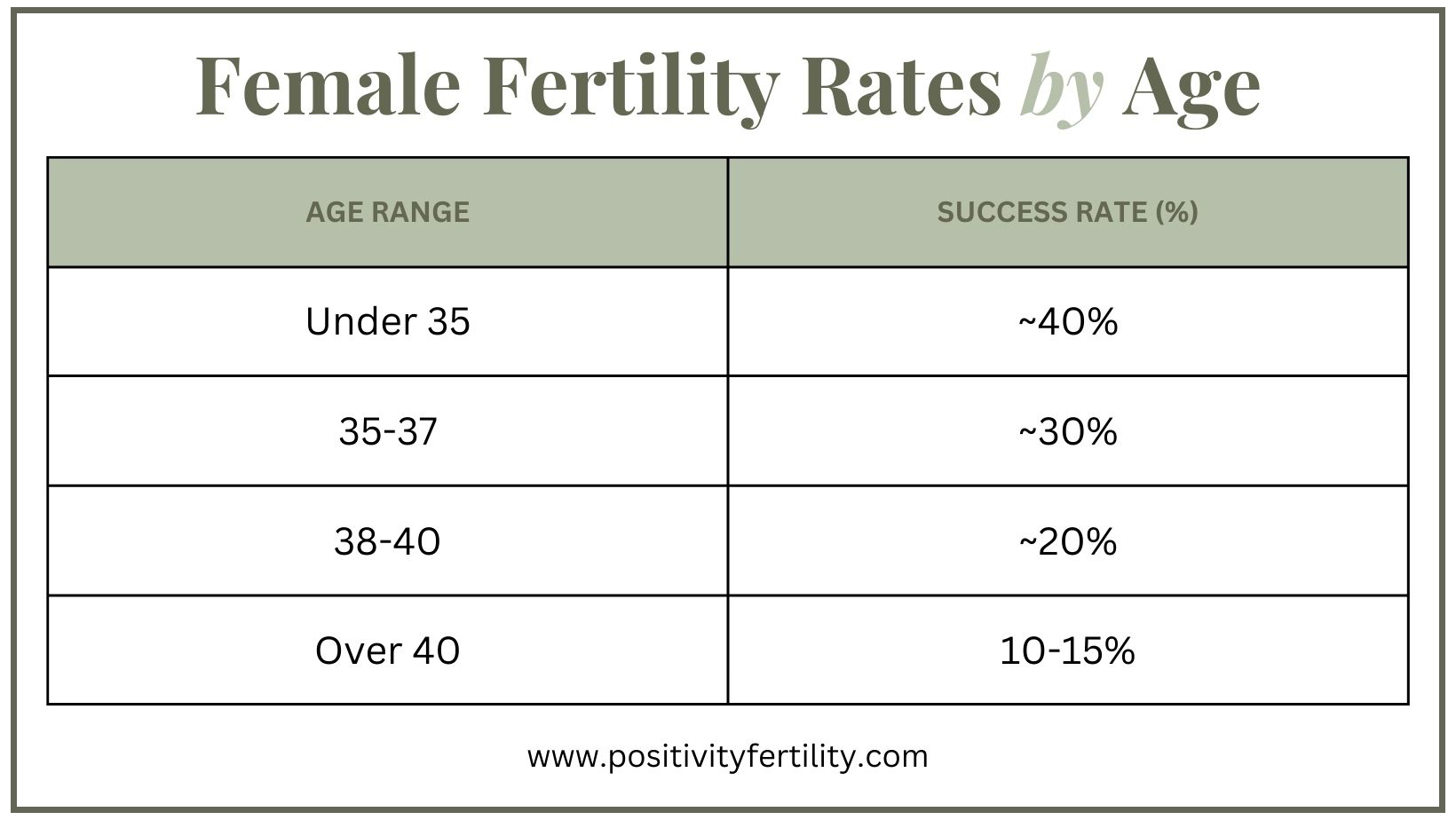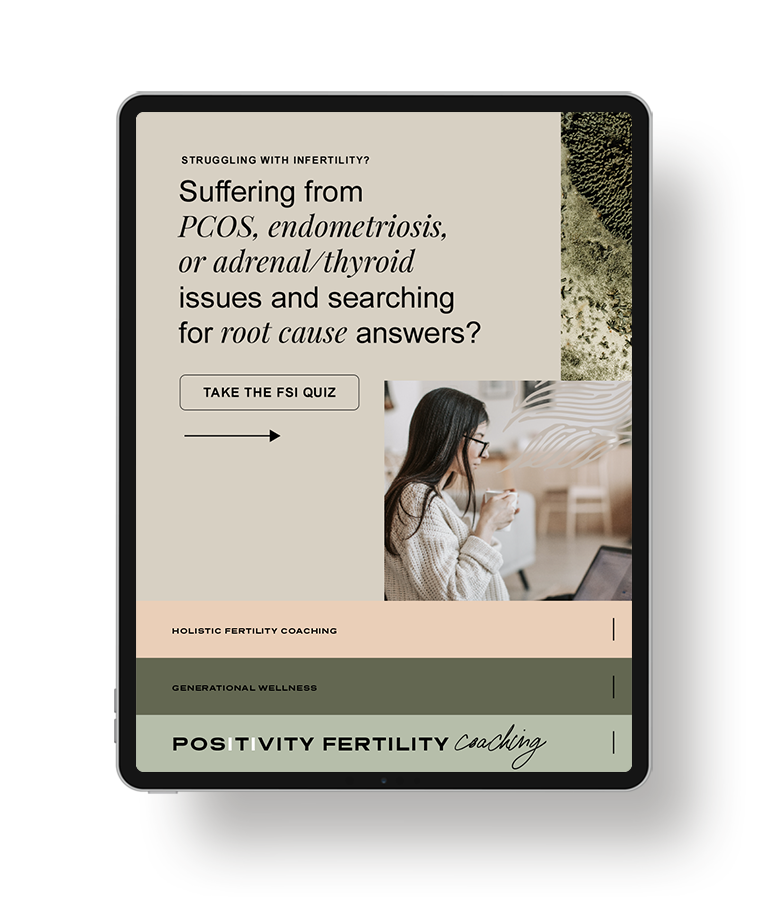But what if IVF didn’t work?
The emotional and physical toll of the IVF process can be significant, involving multiple doctor visits, hormone injections, and procedures. When these efforts don’t result in a pregnancy, the disappointment can be overwhelming.
However, it’s important to recognize that a failed IVF cycle is more common than you might think.
In this blog post, we’ll take a look at IVF success rates, and discuss how functional medicine can offer alternative paths to achieving parenthood.

In Vitro Fertilization (IVF) Success Rates: What You Need to Know
A successful IVF cycle can vary widely based on several factors, including age, overall health, and specific fertility issues. Understanding these factors is crucial to help you navigate your next steps.
Age
When considering an IVF cycle, having realistic expectations about success rates is crucial for your emotional and physical journey.
For women under 35, the success rate is around 40%. However, as age increases, the success rate decreases. Women aged 35-37 have a success rate of about 30%, while those aged 38-40 have around 20%. For women over 40, the success rate drops to about 10-15%.
Understanding these statistics can help you gauge your chances and make informed decisions about your fertility treatment.

Overall Health
Overall health plays a crucial role in IVF success. Factors such as weight, lifestyle, and underlying medical conditions can all impact the outcome. Additionally, genetic variations and poor-quality eggs can significantly affect the success of an IVF cycle.
Here are some key considerations for maintaining good overall health to improve your IVF success rates:
- Maintain a Healthy Weight: Being overweight or underweight can negatively affect IVF success. Aim for a BMI within the normal range (18.5-24.9), as studies show that women with a healthy BMI have higher success rates.
- Avoid Smoking and Alcohol: Smoking can reduce fertility and lower IVF success rates by affecting both sperm and egg quality. Similarly, excessive alcohol consumption can interfere with fertility, so it’s best to avoid these substances when trying to conceive.
- Manage Stress: Chronic stress can impact hormone levels and overall health, affecting fertility. Consider stress management techniques such as yoga, meditation, or counseling to maintain a balanced state of mind.
- Healthy Diet: A balanced diet rich in fruits, vegetables, whole grains, and lean proteins supports overall health and can improve fertility. Antioxidant-rich foods can help reduce oxidative stress on eggs and sperm.
- Regular Exercise: Moderate exercise can boost overall health and improve fertility. Aim for at least 30 minutes of moderate exercise most days of the week, but avoid intense workouts that could have the opposite effect.
- Medical Conditions: Conditions like PCOS, endometriosis, and thyroid disorders can impact fertility. Working closely with your healthcare provider to manage these conditions can improve your chances of IVF success.
By focusing on these health factors, you can optimize your fertility and improve your chances of a successful IVF cycle.

Fertility Issues
Specific fertility issues such as low ovarian reserve, poor egg quality, and sperm abnormalities can influence the chances of success. It’s important to work closely with your fertility specialist to understand your specific situation and explore all possible treatments and interventions.
Remember that tailored approaches can sometimes improve success rates, even in challenging cases.
A failed IVF cycle is not the end of the road, it’s essential to remember that IVF success varies.
While it can be disheartening when IVF doesn’t work, understanding the contributing factors can provide clarity and hope. Knowing the reasons behind the challenges allows you to take proactive steps to address them. This might include lifestyle changes, exploring alternative treatments, or seeking support from specialists who can offer personalized strategies.
By focusing on these health factors and working closely with your medical team, you can better prepare for your IVF journey and explore alternative paths to achieving parenthood if needed.
Remember, every step you take brings you closer to your goal, and there are always options and support available to help you along the way.

Exploring Alternatives Post-IVF Cycle
A failed IVF cycle can be a challenging experience, but it’s important to remember that there are other options available.
Here are some medical interventions and holistic approaches you can consider when IVF cycles fail:
Medical Interventions
- Intrauterine Insemination (IUI): IUI is a less invasive and less expensive option compared to IVF. It involves placing sperm directly into the uterus around the time of ovulation. This method can be effective for certain fertility issues and might be worth exploring if you haven’t already tried it.
- Donor Eggs or Sperm: Using donor eggs or sperm can be an option if there are issues with egg or sperm quality. This method can significantly increase the chances of a successful pregnancy, especially for women over 40 or those with low ovarian reserve.
- Surrogacy: Surrogacy involves another woman carrying and delivering a baby for you. This can be a viable option if you’re unable to carry a pregnancy to term. There are two types: traditional surrogacy (where the surrogate’s egg is used) and gestational surrogacy (where your egg and sperm or donor materials are used).
Functional Medicine: A Holistic Approach
Functional medicine offers a comprehensive approach to improving fertility by focusing on the root causes of health issues rather than just treating symptoms
Here’s how it can help:
- Personalized Nutrition Plans: Functional medicine practitioners can design nutrition plans that address specific deficiencies and optimize your diet for fertility. Nutrient-rich foods and supplements can support reproductive health and improve your overall well-being.
- Hormonal Balance: Balancing hormones naturally through diet, lifestyle changes, and targeted supplements can enhance fertility. Functional medicine emphasizes identifying and correcting hormonal imbalances that might be hindering your ability to conceive and successfully implant a fertilized egg.
- Stress Management: Chronic stress can have a significant impact on fertility. Functional medicine incorporates stress management techniques such as mindfulness, yoga, and meditation to help reduce stress levels and support reproductive health.
- Detoxing: Reducing exposure to environmental toxins and supporting the body’s natural detoxification processes can improve fertility. Functional medicine provides strategies for minimizing toxin exposure and enhancing liver function to eliminate harmful substances from the body.
- Improving Gut Health: A healthy gut is crucial for overall health and fertility. Functional medicine focuses on healing the gut through dietary changes, probiotics, and addressing food sensitivities, which can improve nutrient absorption and hormonal balance.
By incorporating the foundations of health and tenets of functional medicine into your fertility plan, you can increase your chances of achieving parenthood

The Role of Functional Medicine
When it comes to fertility, functional medicine can play a crucial role by addressing lifestyle factors, diet, and stress management.
Here’s how these elements can impact fertility and the strategies we use at Positivity Fertility to support our clients.
Lifestyle Changes
Lifestyle changes are fundamental in improving fertility and even small adjustments in daily habits can make a significant difference in reproductive health.
Here are some key lifestyle changes to consider:
- Maintain a Healthy Weight: A balanced diet and regular exercise can help achieve and maintain a healthy weight.
- Avoid Harmful Substances: Smoking, excessive alcohol, and recreational drugs can negatively impact fertility. Quitting these habits can improve overall health and increase your chances of conception.
- Prioritize Sleep: Quality sleep is essential for hormone regulation and overall health. Aim for 7-9 hours of sleep per night to support your body’s natural rhythms and reproductive health.

Diet
A nutritious diet is vital for optimizing fertility. At Positivity Fertility, we emphasize the importance of nutrient-dense foods to support reproductive health.
Here are some dietary strategies we recommend:
- Fertility-Boosting Foods: Include foods rich in antioxidants, vitamins, and minerals such as leafy greens, berries, nuts, seeds, and lean proteins. These foods can help improve egg quality and sperm quality.
- Balanced Macronutrients: Ensure a balance of carbohydrates, proteins, and fats in your diet. Healthy fats, in particular, are crucial for hormone production.
- Hydration: Staying well-hydrated supports overall health and can improve cervical mucus quality, making it easier for sperm to reach the egg.
- Reduce Processed Foods: Limiting intake of processed foods, sugar, and trans fats can help reduce inflammation and improve reproductive health.
Stress Management
Chronic stress can disrupt hormonal balance and affect fertility, hence the importance of effective stress management as a key component of functional medicine.
Here are some stress management techniques we advocate:
- Mindfulness and Meditation: Practicing mindfulness and meditation can help reduce stress levels and improve mental well-being. These practices promote relaxation and hormonal balance.
- Yoga and Physical Activity: Regular physical activity, including yoga, can help reduce stress and improve overall health by enhancing blood flow to reproductive organs.
- Counseling and Support Groups: Emotional support is crucial during the fertility journey which makes counseling and support groups a safe space to share experiences and cope with stress.

Functional Medicine Strategies at Positivity Fertility
At Positivity Fertility, we use a variety of functional medicine strategies tailored to each client’s needs.
Here are some examples of how we support our clients:
- Personalized Nutrition Plans: We design nutrition plans based on individual needs, addressing specific deficiencies and optimizing diets for fertility.
- Hormonal Assessments: We conduct thorough hormonal assessments to identify imbalances and create targeted treatment plans to restore hormonal health.
- Detox Programs: Our detox programs help reduce exposure to environmental toxins and support the body’s natural detoxification processes.
- Gut Health Optimization: We focus on healing the gut through dietary changes, probiotics, and addressing food sensitivities to improve nutrient absorption and hormonal balance.
When many women experience IVF failure, turning to a functional medicine approach at a reputable fertility clinic can provide new hope.
Working with an experienced IVF specialist who understands the importance of holistic care can make a significant difference in your fertility journey.
By incorporating these functional medicine strategies, our goal is to optimize fertility and overall health. Our holistic approach ensures that each client receives comprehensive care, addressing all aspects of their well-being to support their journey towards parenthood, especially when IVF treatment fails and you’re seeking new paths forward.

Empowering Your Fertility Journey
Taking the time to understand your body and its signals is an essential part of the fertility journey. By gaining insights into your body’s unique needs, you can optimize your health and improve your chances of achieving parenthood, especially if you face unexplained infertility.
Here are some ways to empower yourself:
- Track Your Cycle: Understanding your menstrual cycle can provide valuable insights into your fertility. Tracking your cycle helps you identify ovulation patterns and optimal fertility windows.
- Listen to Your Body: Pay attention to how your body responds to different foods, activities, and stress levels. Noticing these patterns can help you make informed choices about your health.
- Seek Professional Guidance: Working with a fertility specialist can help you understand your body’s unique needs. They can provide tailored advice and support based on your specific situation, whether it involves infertility or issues related to a woman’s ovaries.
- Educate Yourself: Learning about fertility, reproductive health, and the impact of lifestyle factors can empower you to take control of your fertility journey. Books, reputable websites, and workshops can be valuable resources.
Building a Support Network
The journey to parenthood can be challenging, and having a strong support network can make a significant difference when dealing with infertility.
Here are some ways to leverage a supportive community:
- Join Support Groups: Connecting with others who are going through similar experiences can provide emotional support and valuable insights. Online forums, local meetups, and fertility support groups can be excellent resources.
- Engage with Online Communities: Social media platforms and online communities offer a wealth of information and support. Joining groups focused on fertility and functional medicine can help you stay informed and motivated. Having trouble finding the right community? Join our Facebook Group here.
- Involve Your Partner: Open communication with your partner is essential. Sharing your thoughts and feelings can strengthen your relationship and ensure you both feel supported throughout the journey.
By empowering yourself with knowledge, support, and professional guidance, you can take proactive steps towards achieving parenthood. Remember, many women face challenges on their fertility journey, but with the right strategies and support, you can find the path that works best for you.

Finding Hope and Support
Fertility can be challenging, especially when facing infertility or unexplained infertility, but it’s important to remember that you have options and support available. Whether you’re considering alternative medical interventions or exploring the comprehensive approaches of functional medicine, there are many paths to parenthood.
At Positivity Fertility, we are dedicated to helping you understand your body, optimize your health, and empower your fertility journey. Our holistic program is designed to provide personalized guidance, addressing the root causes of fertility issues and offering tailored strategies to enhance your chances of success, even when an IVF cycle or multiple IVF cycles have failed.
We encourage you to explore holistic approaches and consider joining Positivity Fertility’s program for the support and expertise you need. Every step you take brings you closer to achieving your dream of parenthood, and we are here to support you every step of the way.
Remember, you are not alone on this journey.
When IVF fails, it’s natural to feel disheartened, but with the right guidance and resources, your path to parenthood can be a fulfilling and hopeful experience.






